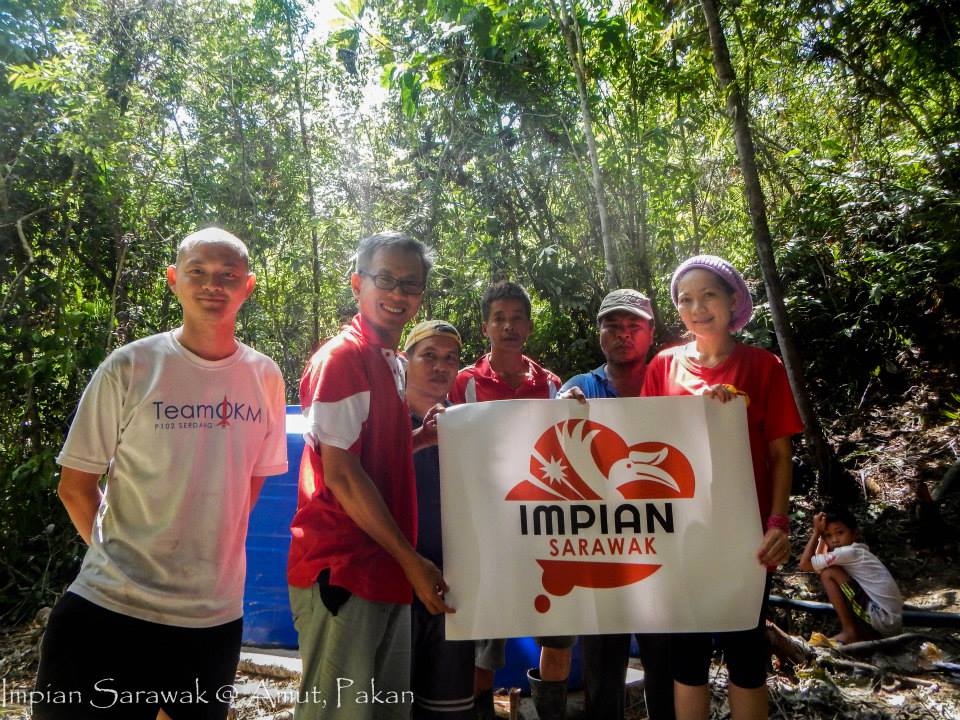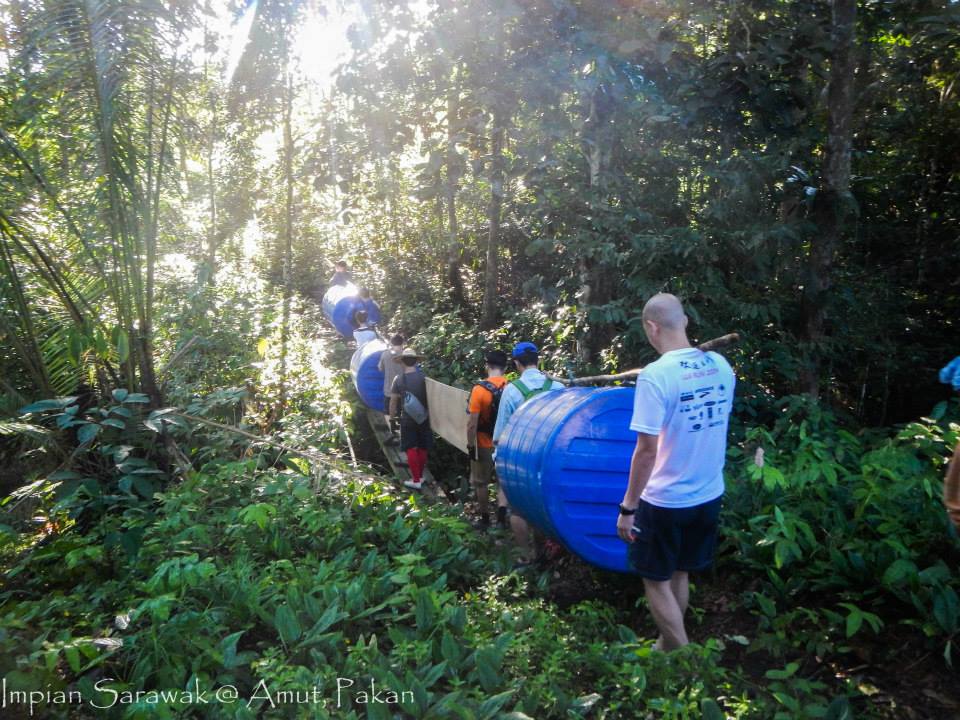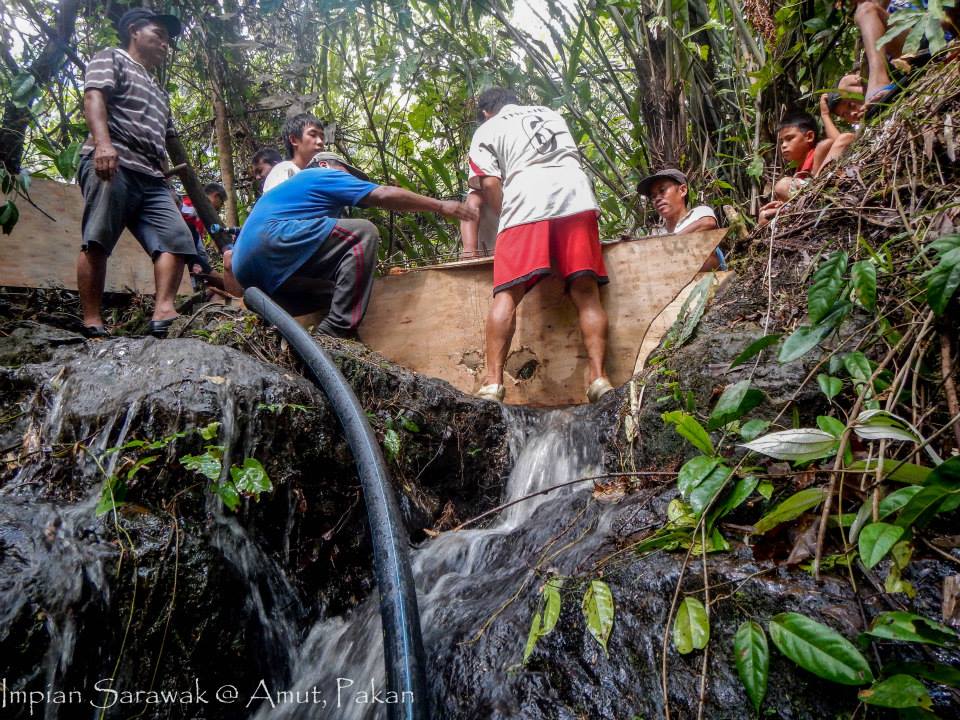 Joining the Impian Sarawak project to build a gravity water feed system in the interior of Sarawak was an eye-opening experience for Izmil Amri, who came back feeling that he got more than he bargained for. In this personal account, the writer shares his journey into the heart of the thick Borneo jungle and the magical discoveries he found there.
Joining the Impian Sarawak project to build a gravity water feed system in the interior of Sarawak was an eye-opening experience for Izmil Amri, who came back feeling that he got more than he bargained for. In this personal account, the writer shares his journey into the heart of the thick Borneo jungle and the magical discoveries he found there.
Sarawak was different. From the moment I first set foot in the hornbill state, this Penang-bred city boy felt the difference. The weather, the smells, the faces, the feel, everything was entirely different from what I had been accustomed to.
It felt surreal at first, setting foot in a place with so many unfamiliar sights and sounds, but was actually another state of the same country.
Kuala Lumpur, my adopted home for the past decade or so, was a thousand miles away, and so was technology, civilisation, and surprisingly basic necessities, of water, electricity and proper road access.
 Most of the volunteers were incredibly oblivious to what they were getting themselves into when they signed themselves up for this volunteer program. With the sole motivation coming from only themselves, they had to pay for their own airfare, program fee and make the arduous trek into the unknown equatorial rainforest.
Most of the volunteers were incredibly oblivious to what they were getting themselves into when they signed themselves up for this volunteer program. With the sole motivation coming from only themselves, they had to pay for their own airfare, program fee and make the arduous trek into the unknown equatorial rainforest.
Their willingness – their blind willingness- was all for a cause to better the livelihood of fellow Malaysians who had been neglected by the system for more than 50 years.
The premise was simple – after 50 years, how could there still be parts of Malaysia that did not have clean running water?
Our hearts moved by the great need, we hopped on a plane and found ourselves in an unforgettable adventure.You should see the surprised looks on our faces when we finally reached Amut.
This particular gravity water feed system was for the benefit of two longhouses in Sibu, Rumah Awin and Rumah Abi. We stayed in Rumah Awin, with each volunteer being assigned to a foster parent (or family). Our foster parents who would host us for the duration of the project, prepared a multitude of pillows and mattresses to welcome us.
We arrived late in the evening on a Friday, early December. The first night was a celebration of sorts. The locals usually go to sleep by 8pm, having nothing much to do there. But that night was spent talking and sharing stories over bottles of ‘tuak’ of which you should politely refuse so as not to offend the host. After the hearty sharing, laughter, breaking the ice and learning to communicate with each other, we went to bed at midnight, accompanied by the chirping insect sounds and cool jungle air.
A culture so different and diverse
 A television set proudly sits in the main ‘pintu’ of the rumah (longhouse). But it has no antenna nor anything remotely resembling a device to receive transmissions. In fact, there is no electricity in the longhouse either; save the sole generator which is turned on at six in the evening.
A television set proudly sits in the main ‘pintu’ of the rumah (longhouse). But it has no antenna nor anything remotely resembling a device to receive transmissions. In fact, there is no electricity in the longhouse either; save the sole generator which is turned on at six in the evening.
Throughout the first two days, we sat around doing nothing. There is a wide communication gap. Most of our hosts are fluent in Iban and only Iban. Bahasa Malaysia comes occasionally from words that share the same sound and meaning in Iban.
I never had the opportunity to ever understood this culture so foreign, so distant yet so close by. Penang felt not as diverse as I wanted it to be when compared to Sarawak.
Only one girl in the village has ever completed her SPM. “You’re the only one here wearing glasses,” I say to her. She smiled and talked about wanting to further her studies. Of wanting to become a teacher.
The ‘tuai’ (Chief) of rumah Awin (whose name is of course Awin) used to be an offshore oil rig worker since 1989 until 2007 when he decided to come home and plant pepper.
He kept repeating the word ‘transparency’, insisting that everything should always be made clear. And that there is no sense in making nor keeping people confused. He was, and still is, and ‘international man’ he says.
He has seen everything all over the world, and because of that it was rather impossible to confound him. He speaks little English, but insisted in speaking the language with the two MPs of Serdang and Petaling Jaya Utara, Dr Ong Kian Ming and Tony Pua who joined the project.
The 14 ‘pintu’ (rooms within the house) all consisted of his family members, with at least three to four persons to a particular ‘pintu’ during school holidays. Or else the children will be at their school hostels, and the rest working as farmers will be at their farmhouses much closer to their farms, further away from the longhouse. They grow pepper, oil palm and assorted veggies and fruits.
A trip to the local market all the way out in the small township of Sibujaya is another experience in diversity unfounded on Peninsular soil, or perhaps just limited to how far my feet have taken me.
A sign over a bucket of freshly butchered python meat proclaims that it was sold at RM10 per kilo. Alongside it a choice of ayam hutan still in their cages and an assortment of shoots and leaves I had never laid eyes on before.
On another part of the market complex, a small food court caters to halal food, while another part of it is dedicated as a wet market with all sorts of products brought in from the kampung; most probably grown by the folk at Amut, Pakan.
Pakan, as its name suggests is a small town consisting of two rows of shophouses. From then onwards spiralled a labyrinth of roads accessible only with four wheeled drive vehicles, leading to the villages and longhouses.
9 o’clock in the morning never felt so slow. As the womenfolk huddle in the kitchen preparing breakfast, I join the rest just sitting and looking into empty space, after failing miserably to fit in and contribute to anything at all in the kitchen.
It was a humbling feeling, digesting and appreciating how time moves at a pace much slower than the hustle and bustle of KL. Sitting around and looking out the window became a norm, although the scenery never changed.
The longhouse looked much like a warehouse. With uneven cement floors that looks unfinished, and cement bags still sitting in a pile, it makes you think about what it means to live in the deep jungles of Sibu.
Come to think of it, even foreign workers have access to electricity and water. But natives of the land are yet to receive such amenities even after half a century of independence.
Bringing piped water, and change, home
The distance from our temporary home, Rumah Abi to the dam site was approximately four kilometres, but the journey took much longer than expected. When they first told me that the path leading up to the dam was what they termed ‘jalan bagus’ (good roads), I did not expect it to mean a path only one foot wide with bush, trees, mud and river along the way.
It was a hard trek for a city boy unaccustomed to walking in the jungle. The hot sun was a blessing. It allowed the volunteers with the help of the orang kampung to complete quite a substantial amount of work in just a few days. Six days to be exact.
That was how long it took to install a piping system from the dam to 35 separate ‘pintu’ from six 20 gallon tanks placed near the dam as secondary storage. Once this was completed, the villagers finally could enjoy piped water in their village and not have to worry about having to carry back clean water from sources miles away on foot.
I didn’t help much with the work at the dam. After breaking a small wooden bridge of the fourth stream on the first day I went trekking into the forest, I opted to stay behind instead; helping to unravel the pipes.
Everyday the volunteers and locals worked side by side in the dam. Slowly but surely, metre by metre, pipe by pipe, the project came into shape. As they toiled and sweated together, they forged a bond and broke down barriers between cultures that were so gaping when we first arrived.
With the transfer of technology, we hope that the villagers are able to gain ideas and solutions to build their own locally-sourced projects, while in the future we can continue to provide resources and funding. In this way, we can find sustainable solutions for locals and by locals, so that they need not rely on “peninsular-imported” volunteer tourism.
It took the team less than a week to complete a project which benefited a few hundred people. Both the locals and volunteers felt an immense sense of achievement and purpose to see the project completed with the hard work of their bare hands.
In contrast, a water supply project by BN took a month to just lay down the pipes along the main road leading to Pakan. With so much red tape and cronyism that is inherent in the system, the welfare of the people gets ignored and put on the back burner. It has been so for decades, yet the government is always returned to power.
We hope that the locals can also realise and be aware of how the political realities of the land will affect their everyday lives. If they continue to vote for BN, will they still live without running water and “good roads” for another generation?
We hope more native Sarawakians would go home to vote and bring change to their home state in any way that they can. This small boost is part of our effort to assist, but in the end, change has to come from the locals themselves.
Perhaps, as an “outsider” and not a local, it is hard for me to judge or understand what they go through daily. Nevertheless, I definitely felt that it was a meaningful project to be part of.
Although I was not so much involved in the sweat and toil of physically putting the pipes into place, knowing that in my own way, I was contributing to the project and making a difference in this place made me feel like the trip was worthwhile.
Against all odds, without relying on the government machinery or waiting for red tape to be cleared, the people made the project happen. It was their willpower and solidarity that pushed to project to succeed.
This, to me, was the magic of solidarity that I discovered in the jungles of Amut, Pakan.



